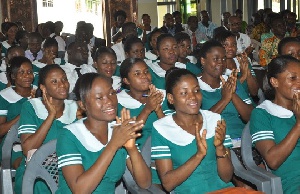Madam Philomins Woolley, the Acting Registrar of the Nursing and Midwifery Council (NMC) of Ghana, says the nursing and midwifery professional training machinery is at a crossroads with increasing student population, compromised quality institutions and programmes.
She said the student-lecturer interaction was important in determining the quality of the teaching and learning process and indicated that it was appropriate and important to monitor the process through quality assurance such as accreditation, support and supervision.
“We are at a crossroads in the training of nurses and midwives in Ghana because the Nursing and Midwifery Training institutions are busting at themselves with an increasing student population.
“The increase in student population has not seen a commiserate increase in infrastructure and human resources,” Madam Woolley said at an ongoing Annual General Meeting (AGM) of the Conference of Heads of Health Training Institutions (COHHETI) in Bolgatanga.
Speaking on the theme: “Quality assurance and accreditation in the training of healthcare professionals: The anchor for quality education,” the Acting Registrar said training institutions overadmitted students to the extent that some did not have spaces to sit.
“I know that in some of the schools, a whole class says they are having online education in nursing. And I heard someone say that we are praying that one day, the NMC will understand that we are in the 20th Century, so we should do online nursing.
“We the stakeholders, therefore, cannot assure the public we serve, of the quality of some of our training institutions and programmes,” Madam Woolley said.
She said students on clinical attachment at various hospitals were more than the patients they attended to, “When you go to some of the hospitals, the trainee nurses and midwives are even more than the patients.”
The Acting Registrar said quality assurance in education and the accreditation of educational programmes required strict adherence to educational programme accreditation requirements and standards, adding that nursing and midwifery training could not be exceptional.
“Commencing nursing and midwifery training programmes without the due professional accreditation from the regulatory body which is statutorily mandated to undertake the accreditation is tantamount not only to being an enemy to the core tenets of quality assurance in nursing and midwifery education but also an enemy to the State,” she said.
Madam Woolley added that quality in nursing and midwifery education was a multi-faceted phenomenon that called for the joint efforts of all key stakeholders, insisting that “We need the quality.”
Professor Ahmed Abdullai Jinapor, the Acting Director-General of the Ghana Tertiary Education Commission (GTEC), said in a world where the well-being of individuals depended on the competence and skills of healthcare professionals, who ensured the highest standards of education and training was not just a matter of choice but a moral imperative.
“The quality of healthcare education is the cornerstone upon which the foundation of any nation’s healthcare system rests. It doesn’t only affect the lives of individuals, but also determines the overall health and well-being of a society.
“In developing countries such as ours, where healthcare resources are often limited, the need for high-quality training of healthcare professionals is even more critical since it solves the human resource challenge of our healthcare system,” he said.
The Acting GTEC Director-General said the healthcare sector was a noble and vital one, as it concerned the health and well-being of individuals and communities.
“It is imperative that those who aspire to become healthcare professionals receive education of the highest quality to ensure that they are prepared to meet the challenges and complexities of modern healthcare,” he said.
General News of Sunday, 29 October 2023
Source: GNA













